February 12, 2015 •
South Carolina Senate Votes Down Ethics Bill
The Senate has voted down a bill to overhaul ethics laws. Senate Bill 1 failed by a 19 to 24 vote on Wednesday, February 11. The main issue Senators could not agree on was whether lawmakers should be involved in […]
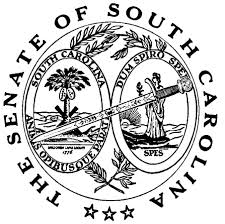 The Senate has voted down a bill to overhaul ethics laws. Senate Bill 1 failed by a 19 to 24 vote on Wednesday, February 11.
The Senate has voted down a bill to overhaul ethics laws. Senate Bill 1 failed by a 19 to 24 vote on Wednesday, February 11.
The main issue Senators could not agree on was whether lawmakers should be involved in the process of investigating themselves. The majority of senators believed an independent panel to investigate senators’ conduct solves a problem that does not exist.
The Senate still has a chance to consider a similar version of the bill passed unanimously by the House.
January 19, 2015 •
Indiana Ethics Bill Introduced with Bipartisan Support
Indiana House Speaker Brian Bosma and House Minority Leader Scott Pelath have co-sponsored an ethics bill aimed at improving transparency and reducing conflicts of interest. The proposal would tighten the rules on waivers for the one-year “cooling off” period for […]
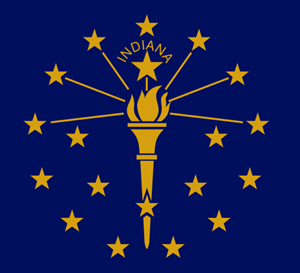 Indiana House Speaker Brian Bosma and House Minority Leader Scott Pelath have co-sponsored an ethics bill aimed at improving transparency and reducing conflicts of interest.
Indiana House Speaker Brian Bosma and House Minority Leader Scott Pelath have co-sponsored an ethics bill aimed at improving transparency and reducing conflicts of interest.
The proposal would tighten the rules on waivers for the one-year “cooling off” period for state agency officials taking private-sector jobs dealing with their former departments.
It would also expand the financial disclosure requirements for legislators and require them to disclose any relatives who are lobbyists.
January 12, 2015 •
WA Legislature Considers Revolving Door Ban
A new ethics bill scheduled to be proposed in the Washington Legislature would impose a revolving door ban on state legislators, statewide elected officials, and directors of cabinet-level agencies. The proposal was developed by Attorney General Bob Ferguson and Rep. […]
 A new ethics bill scheduled to be proposed in the Washington Legislature would impose a revolving door ban on state legislators, statewide elected officials, and directors of cabinet-level agencies.
A new ethics bill scheduled to be proposed in the Washington Legislature would impose a revolving door ban on state legislators, statewide elected officials, and directors of cabinet-level agencies.
The proposal was developed by Attorney General Bob Ferguson and Rep. Reuven Carlyle, D-Seattle.
The bill would impose a “cooling off” period, where said officials could not lobby state government for one year after leaving office.
Photo of the Washington State Capitol by Nicopoley on Wikimedia Commons.
June 24, 2014 •
Florida Gov. Signs Ethics Bill
Gov. Rick Scott signed Senate Bill 846 into law on Friday, June 20, 2014. The ethics bill takes effect July 1, 2014 and requires lobbyists at Florida’s five water management districts to register and file periodic reports with the Lobbyist […]
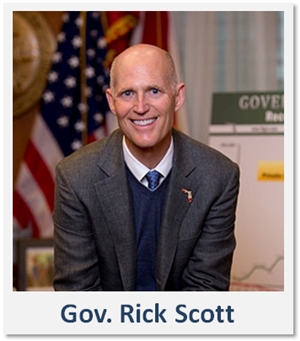 Gov. Rick Scott signed Senate Bill 846 into law on Friday, June 20, 2014. The ethics bill takes effect July 1, 2014 and requires lobbyists at Florida’s five water management districts to register and file periodic reports with the Lobbyist Registration Office of the Florida Legislature.
Gov. Rick Scott signed Senate Bill 846 into law on Friday, June 20, 2014. The ethics bill takes effect July 1, 2014 and requires lobbyists at Florida’s five water management districts to register and file periodic reports with the Lobbyist Registration Office of the Florida Legislature.
The original version of the bill would have required lobbyist registration for individuals seeking to influence any of the 136 independent special districts statewide. Such independent special districts include water management districts, hospital districts, and any other independent special district that exercises ad valorem taxing authority. The final version, however, only requires lobbyist registration for individuals seeking to influence Florida’s water management districts.
Rep. Kathleen Passidomo considered the original version of the bill too broad, thus revising the bill in committee to only impose lobbyist registration on water management districts. Passidomo has said if registration works smoothly at the water districts, the Legislature may consider requiring more special districts to register lobbyists.
April 23, 2014 •
Ohio Lawmakers to Introduce Ethics Reform Legislation
Ohio lawmakers plan to introduce legislation next month making significant changes to state ethics rules for the first time in decades. The bill would double the amount lobbyists can spend on gifts to lawmakers but require lobbyists and public officials […]
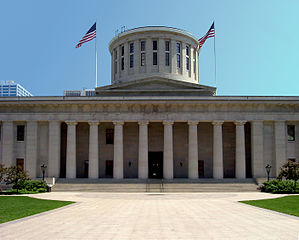
Ohio lawmakers plan to introduce legislation next month making significant changes to state ethics rules for the first time in decades. The bill would double the amount lobbyists can spend on gifts to lawmakers but require lobbyists and public officials to report when a lobbyist spends more than $100 per year on an official for meals, entertainment, transportation, or other gifts.
State Sen. Larry Obhof, a Republican co-sponsor of the bill, maintains a higher reporting threshold is necessary to keep lobbyists honest, as many lobbyists seek to find ways to avoid the lower threshold.
Other notable legislative provisions raise the lobbyist registration fee from $25 to $35, strengthen whistle-blower protection guidelines, allow lawmakers to remedy reporting errors, require random audits of financial disclosure statements, and make changes to procedures for ethics investigations. Bill sponsors argue the bill is intended to increase transparency and accountability.
Photo of the Ohio State Capitol courtesy of Alexander Smith on Wikimedia Commons.
February 27, 2014 •
Amended Ethics Bill Passes Virginia House of Delegates
Comprehensive ethics reform has advanced through the House of Delegates. Senate Bill 649 was passed by the House on February 26 with a committee substitute. The passed bill included an amendment prohibiting the governor and attorney general from accepting […]
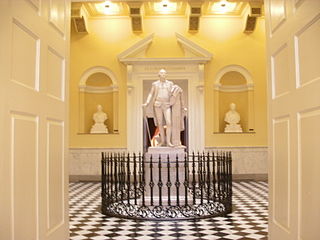 Comprehensive ethics reform has advanced through the House of Delegates. Senate Bill 649 was passed by the House on February 26 with a committee substitute.
Comprehensive ethics reform has advanced through the House of Delegates. Senate Bill 649 was passed by the House on February 26 with a committee substitute.
The passed bill included an amendment prohibiting the governor and attorney general from accepting tangible gifts from representatives of companies engaged in litigation with the state. The amendment stems from former Attorney General Ken Cuccinelli’s acceptance of Thanksgiving dinner from Star Scientific CEO Jonnie Williams, and is designed to prohibit such conduct.
The Senate bill and a similar House proposal will likely be worked into one broad ethics proposal in conference committee before heading to Governor Terry McAuliffe for his signature.
Photo of the Virginia Capitol Rotunda courtesy of Albert Herring on Wikimedia Commons.
January 13, 2014 •
Ethics Bill Introduced in Kentucky
Kentucky could see updates to its legislative ethics code this session. House Bill 3 would amend the state ethics code to include recommendations of the Legislative Ethics Commission, including: Establishing a “no cup of coffee” rule for gifts from lobbyists […]

Kentucky could see updates to its legislative ethics code this session.
House Bill 3 would amend the state ethics code to include recommendations of the Legislative Ethics Commission, including:
- Establishing a “no cup of coffee” rule for gifts from lobbyists and employers to legislators;
- Creating a prohibition on lobbyists and employers paying for out-of-state travel for legislators;
- Including employers of legislative and executive branch lobbyists in the prohibition on campaign contributions during a regular legislative session;
- Requiring the reporting of advertising costs for advertising supporting or opposing legislation; and
- Including legislative candidates in the lobbyist gift prohibition.
The Legislative Ethics Commission has included those recommendations for a number of years in its report to the Legislative Research Commission. The existing ethics law was enacted in 1993.
January 10, 2014 •
South Carolina Senate Committee Recommends Ethics Reform
The bipartisan Senate Select Committee on Ethics has issued its final report and recommendations on an ethics bill to be considered during the start of next week’s legislative session. House Bill 3945 already has 54 pending Senate amendments and will […]

The bipartisan Senate Select Committee on Ethics has issued its final report and recommendations on an ethics bill to be considered during the start of next week’s legislative session. House Bill 3945 already has 54 pending Senate amendments and will likely have more by next week.
The committee’s final report highlighted possible changes to lobbying regulations including a two-year revolving door restriction and a doubling of annual registration fees from $100 to $200. The committee recommends “meaningful and comprehensive ethics reform” to address weaknesses in the current law.
April 26, 2013 •
Florida Ethics Bill Heads to Governor Scott
Adds prohibitions on lobbying by former legislators
 Perhaps the most talked-about piece of legislation this session, Senate Bill 2 was passed unanimously by both houses of the Florida Legislature.
Perhaps the most talked-about piece of legislation this session, Senate Bill 2 was passed unanimously by both houses of the Florida Legislature.
The final ethics bill:
- Prohibits members of the legislature from acting as lobbyists for compensation before an executive branch agency, agency official, or employee for two years after leaving office. The version passed by the House eliminated an original provision preventing legislators from becoming lobbyists or principals of lobbying firms lobbying the legislature;
- Provides for a fine of up to $5,000 for executive branch lobbyists who fail to disclose required material facts as required or knowingly provide false information;
- Allows the Commission on Ethics to investigate whether a lobbyist has made a prohibited expenditure if a complaint is filed; and
- Prohibits vendors from providing gifts to a reporting individual or procurement employee for vendors doing business with the reporting individual’s or procurement employee’s agency.
The ethics bill was a top priority of Senate President Don Gaetz. He called the bill his “proudest moment as a senator.” The bill was sent immediately to Governor Rick Scott, who has seven days to sign or veto the bill.
March 21, 2012 •
Today’s Lobbying News Roundup
Revolving doors, spending on lobbying in Minnesota, and a new ethics bill in Missouri in the news:
 “Revolving Door: Hill Staffers with Retiring Bosses Hit K Street” by Andrew Joseph in National Journal’s Influence Alley.
“Revolving Door: Hill Staffers with Retiring Bosses Hit K Street” by Andrew Joseph in National Journal’s Influence Alley.
“Minnesota Capitol the recipient of $59 million lobbying effort” by Megan Boldt in the Grand Forks Herald.
“Business groups spent $14 million lobbying Minn. Legislators” by Rachel E. Stassen-Berger in the Minneapolis Star-Tribune.
“Democrats propose new Missouri ethics bill” by Elizabeth Crisp in the St. Louis Post-Dispatch. According to the article, “the bill would restrict the amount lawmakers and their immediate family members could accept from lobbyists, prohibit lawmakers from working as paid political consultants while in office and limit the investment of campaign contributions to interest-bearing checking or savings accounts.”
“Utah’s revolving door keeps spinning out lobbyists” by Britny Mortensen in The Salt Lake Tribune.
December 21, 2011 •
D.C. Council Passes Ethics Bill
Bill Creates Ethics Panel and Impeachment Process
 WASHINGTON, D.C.: By a 12-1 margin, the D.C. Council has passed an ethics bill that seeks to increase accountability for council members.
WASHINGTON, D.C.: By a 12-1 margin, the D.C. Council has passed an ethics bill that seeks to increase accountability for council members.
The bill includes provisions to establish a new three-member ethics panel, bar felons from serving on the council or as mayor, and grant powers to the D.C. attorney general to prosecute elected officials accused of ethical misconduct.
The legislation will be sent to Mayor Vincent Gray for his approval.
Photo of the John A. Wilson Building by Awiseman on Wikipedia.
December 20, 2011 •
Baltimore County, MD Passes Ethics Bill
Original bill was scaled back.
 The Baltimore County Council has passed a wide-ranging ethics bill after scaling back parts of the original bill proposed by County Executive Kevin Kamenetz. A series of amendments sponsored by all seven council members weakened parts of the original bill dealing with when officials can accept gifts and what defines a conflict of interest for council members.
The Baltimore County Council has passed a wide-ranging ethics bill after scaling back parts of the original bill proposed by County Executive Kevin Kamenetz. A series of amendments sponsored by all seven council members weakened parts of the original bill dealing with when officials can accept gifts and what defines a conflict of interest for council members.
In an effort to exceed the requirements set by a 2010 state law, Kamenetz’s original bill said public officials could not accept gifts from someone they know does business “with the county.” The council narrowed the rule to say they could not accept gifts from anyone they know does business with the “public official’s office, agency, board or commission.”
The new bill also deleted an entire section defining conflicts of interest specifically for council members in favor of a broader definition that applies to all public officials. The new bill still requires elected officials’ financial disclosure forms to be posted online starting in May 2012.
April 14, 2011 •
West Virginia Ethics Bill Passes
Acting Governor Tomblin signed House Bill 2464 into law late last week.
 This ethics bill, which takes effect on July 1, 2011, prohibits members of the state legislature, elected executive branch officials, agency heads, and certain other appointed officials from acting as lobbyists for one year after leaving office.
This ethics bill, which takes effect on July 1, 2011, prohibits members of the state legislature, elected executive branch officials, agency heads, and certain other appointed officials from acting as lobbyists for one year after leaving office.
Additionally, this legislation will require a public official who files financial disclosure statements to reveal employment information and other “business interests” of his or her spouse.
The spousal disclosures are designed to shine light on additional conflicts of interest an official may have even without a personal stake in a matter.
Photo of the West Virginia State Capitol by Garkeith on Wikipedia.
State and Federal Communications, Inc. provides research and consulting services for government relations professionals on lobbying laws, procurement lobbying laws, political contribution laws in the United States and Canada. Learn more by visiting stateandfed.com.


